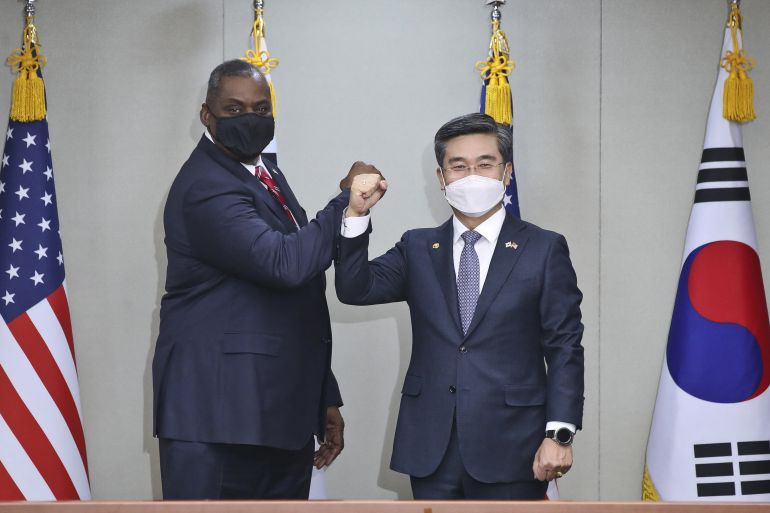US says S Korea alliance ‘important’ to counter China, N Korea
Antony Blinken and Lloyd Austin due to hold talks with their South Korean counterparts on security challenges from Beijing and Pyongyang.

US President Joe Biden’s defence and foreign policy chiefs have arrived in South Korea for the second leg of a regional tour aimed at boosting Washington’s Asian alliances to better deal with growing challenges from China and North Korea.
While in Seoul, US Secretary of State Antony Blinken and the defence secretary, Lloyd Austin, met with South Korean counterparts for separate talks on Wednesday and will hold a joint “two plus two” meeting on Thursday, the first such contact between the two countries in five years.
Keep reading
list of 4 itemsBlinken to make US’s ‘tough approach’ clear in first China talks
US, Japan decry China’s ‘coercion and destabilising behaviour’
China, North Korea top agenda as Blinken begins first Asian tour
Blinken and Lloyd’s Asian tour is the first overseas trip by top-level members of Biden’s administration. On Tuesday, the pair were in Japan’s capital, Tokyo, where they joined forces with Japanese officials to criticise China’s “coercion and aggression” and reaffirm their commitment to ridding North Korea of all its nuclear bombs.
The latter topic will be the focus of Blinken and Austin’s discussions in South Korea.
US-led diplomacy on the topic has been in limbo since a February 2019 summit between former President Donald Trump and North Korean leader Kim Jong Un collapsed over disputes on US-led sanctions. Kim has since threatened to enlarge North Korea’s nuclear arsenal in protest of what he called US hostility.
Following the meeting between Blinken and South Korean Foreign Minister Chung Eui-yon in Seoul, the State Department issued a statement saying both officials agreed to work together to resolve North Korea’s nuclear and missile issues, calling them a “priority”.
South Korea’s Ministry of Foreign Affairs also said they agreed to continue discussions to arrange a summit between Presidents Moon Jae-in and Joe Biden as early as possible, and to coordinate on North Korea as Washington’s policy is under way.
Meanwhile, Austin, speaking to reporters before meeting his South Korean counterpart, Suh Wook, called the US-South Korea alliance a “linchpin” for peace, security and prosperity in Northeast Asia, and for a free and open Indo-Pacific region and beyond.
“The US-South Korea alliance is ever more important because of the unprecedented threats from China and North Korea,” he added.
For his part, Suh said it was important for the allies to maintain a strong deterrence and joint defence posture against North Korea, and promised to strengthen the alliance, according to Yonhap news agency.
But he pointedly made no mention of China, according to Al Jazeera’s Rob McBride in Seoul.
“South Korea’s relationship with China is far more nuanced than Japan’s. South Korea relies on China far more for trade and wants to avoid, whenever possible, a head-on clash with Beijing,” said McBride.
He noted that when South Korea allowed the US to install an anti-North Korea missile defence shield on its soil in 2017, it suffered economic retaliation from China, which sees the system’s radar as a security threat.
‘Refrain from causing a stink’
On Tuesday, North Korean leader Kim’s sister, Kim Yo Jong, slammed the United States over its continuing regular military drills with South Korea, which Pyongyang sees as an invasion rehearsal.
“We take this opportunity to warn the new US administration,” Kim Yo Jong said in a statement. “If it wants to sleep in peace for [the] coming four years, it had better refrain from causing a stink at its first step.”
Some experts say Kim Yo Jong’s statement is a pressure tactic and that Pyongyang may try to further raise animosities with weapons tests to boost its leverage in future negotiations with Washington.
Asked about Kim Yo Jong’s statement during a news conference in Tokyo earlier on Wednesday, Blinken said he was familiar with the comments and was more interested in hearing from allies and partners.
Blinken said Washington reached out to North Korea through several channels starting in mid-February, but it has not received any response. He said the Biden administration is looking forward to completing its policy review on North Korea in the coming weeks and was looking both at possible “additional pressure measures” and “diplomatic paths”.
In Seoul later in the day, Blinken took aim at North Korea’s human rights record, saying Pyongyang “continues to commit systemic and widespread abuses against its own people”.
“We must stand with the people that demand fundamental rights and freedom against those who repress them,” he added.